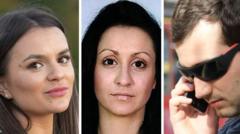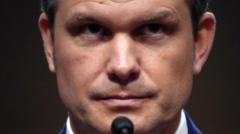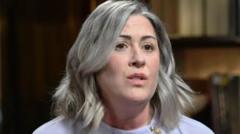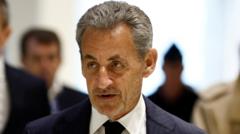Adèle Haenel, the acclaimed French actress, took a powerful stand in court against filmmaker Christophe Ruggia, who has been accused of sexually assaulting her during her childhood. The trial revealed harrowing details of the alleged abuse and Haenel's poignant journey in confronting her past.
Adèle Haenel's Emotional Confrontation in Ruggia Sexual Assault Trial
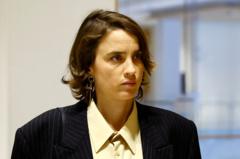
Adèle Haenel's Emotional Confrontation in Ruggia Sexual Assault Trial
French actor Adèle Haenel publicly confronts director Christophe Ruggia during his trial for alleged sexual assault.
Ruggia, who is 59, faced allegations stemming from incidents in the early 2000s when Haenel was aged between 12 and 15. During the trial, Haenel confronted Ruggia, telling him to "shut up" as he attempted to defend himself by claiming he was merely trying to "protect" her during her early career. Haenel charged him with manipulation and control while asserting that he isolated her from her parents, subjecting her to unwanted advances while promoting a toxic working environment.
In scenes echoing the revelations of the MeToo movement, Haenel has since vowed to leave the French film industry, citing its complacency toward sexual predators. Her decision to speak out, driven in part by viewing the documentary "Leaving Neverland," has opened a dialogue about abuse in the industry, igniting further accusations against other notable figures in French cinema.
Throughout the trial, prosecutor Camille Poch strongly defended Haenel's claims, stating that there was “no doubt” about the accuracy of her allegations. Ruggia, while admitting past errors, has continually dismissed the accusations as fabrications rooted in a personal vendetta.
With a verdict expected on 3 February, Haenel's bold confrontation at this trial represents a significant moment for sexual assault survivors and the reckoning within the French film community. The actress has requested financial compensation for moral damages and psychological support costs, emphasizing the long-lasting impact of her trauma.
As the trial continues to draw public attention, it may not only redefine Haenel's legacy but also challenge the accountability of an industry that has historically turned a blind eye to misconduct.
In scenes echoing the revelations of the MeToo movement, Haenel has since vowed to leave the French film industry, citing its complacency toward sexual predators. Her decision to speak out, driven in part by viewing the documentary "Leaving Neverland," has opened a dialogue about abuse in the industry, igniting further accusations against other notable figures in French cinema.
Throughout the trial, prosecutor Camille Poch strongly defended Haenel's claims, stating that there was “no doubt” about the accuracy of her allegations. Ruggia, while admitting past errors, has continually dismissed the accusations as fabrications rooted in a personal vendetta.
With a verdict expected on 3 February, Haenel's bold confrontation at this trial represents a significant moment for sexual assault survivors and the reckoning within the French film community. The actress has requested financial compensation for moral damages and psychological support costs, emphasizing the long-lasting impact of her trauma.
As the trial continues to draw public attention, it may not only redefine Haenel's legacy but also challenge the accountability of an industry that has historically turned a blind eye to misconduct.






